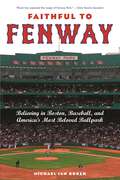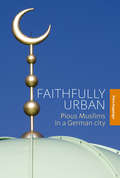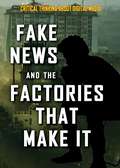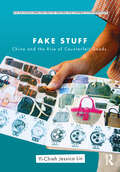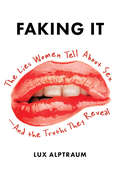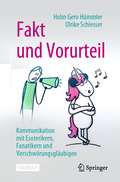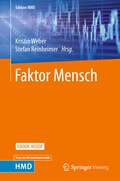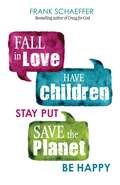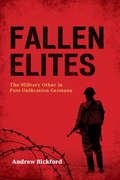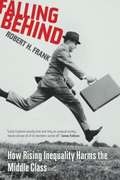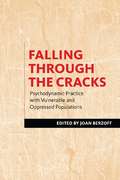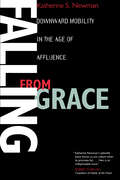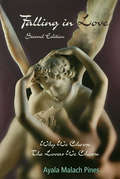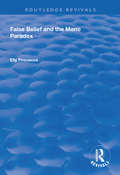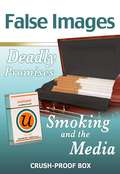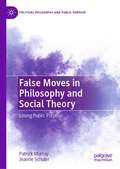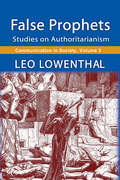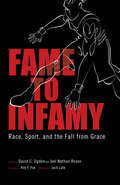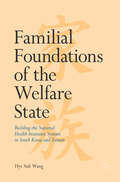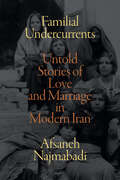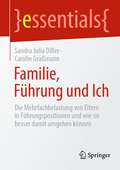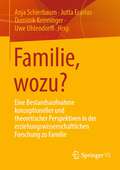- Table View
- List View
Faithful to Fenway: Believing in Boston, Baseball, and America’s Most Beloved Ballpark
by Michael Ian BorerAn unforgettable pilgrimage through America's oldest major league ballparkThe Green Monster. Pesky's Pole. The Lone Red Seat. Yawkey Way. To baseball fans this list of bizarre phrases evokes only one place: Fenway Park, home of the Boston Red Sox. Built in 1912, Fenway Park is Americas oldest major league ballpark still in use. In Faithful to Fenway, Michael Ian Borer takes us out to Fenway where we sit in cramped wooden seats (often with obstructed views of the playing field), where there is a hand-operated scoreboard and an average attendance of 20,000 fewer fans than most stadiums, and where every game has been sold out since May of 2003. There is no Hard Rock Café (like Toronto's Skydome), no swimming pool (like Arizona's Chase Field), and definitely no sushi (which has become a fan favorite from Baltimore to Seattle). As Borer tells us in this captivating book, Fenway is short on comfort but long on character.Faithful to Fenway investigates the mystique of the ballpark. Borer, who lived in Boston before and after the Red Sox historic 2004 World Series win, draws on interviews with Red Sox players, including Jason Varitek and Carl Yastrzemski, management, including Larry Lucchino and John Henry, groundskeepers, vendors, and scores of fans to uncover what the park means for Boston and the people who revere it. Borer argues that Fenway is nothing less than a national icon, more than worthy of the banner outside the stadium that proclaims, “America's Most Beloved Ballpark”. Certainly as one of New England's greatest landmarks, Fenway captures the hearts and imaginations of a deferential and devoted public. There are T-shirts, bumper stickers, banners, and snow globes that honor the ballpark. Fenway shows up in popular films, novels, television commercials, and in replicated form in people's backyards—and coming in 2008 to Quincy, Massachusetts, is Mini-Fenway Park, a replica stadium built especially for kids.Full of legendary stories, amusing anecdotes, and the shared triumph and tragedy of the Red Sox and their fans, Faithful to Fenway offers a fresh and insightful perspective, offering readers an unforgettable pilgrimage to the mecca of baseball.
Faithfully Urban: Pious Muslims in a German City
by Petra KuppingerIn the southern German city of Stuttgart lives a pious Muslim population that has merged with the local population to create a meaningful shared existence. In this ethnographic account, the author introduces and examines the lives of ordinary residents, neighborhoods, and mosque communities to analyze moments and spaces where Muslims and non-Muslims engage with each other and accommodate their respective needs. These accounts show that even in the face of resentment and discrimination, this pious population has indeed become an integral part of the urban community.
Fake News and the Factories that Make It (Critical Thinking About Digital Media)
by Kristina Lyn HeitkampOnce on the fringe, fake news has become mainstream. From bogus social media accounts to Russian troll factories, phony news muddies the social and political discourse, and is a threat to our democracy. This high-interest book defines fake news and reveals the people behind the spread of disinformation. This text directly correlates with state journalism standards about developing media literacy. Readers will also glimpse the future of fake news and the alarming technologies used to make it, such as face-morphing technology. This book will help readers navigate the messy world of fake news.
Fake Stuff: China and the Rise of Counterfeit Goods (Routledge Series for Creative Teaching and Learning in Anthropology)
by Yi-Chieh Jessica Lin"The Anthropology of Stuff" is part of a new Series dedicated to innovative, unconventional ways to connect undergraduate students and their lived concerns about our social world to the power of social science ideas and evidence. Our goal with the project is to help spark social science imaginations and in doing so, new avenues for meaningful thought and action. Each "Stuff" title is a short (100 page) "mini text" illuminating for students the network of people and activities that create their material world. Yi-Chieh Lin reveals how the entrepreneurial energy of emerging markets, such as China, includes the opportunity to profit from fake stuff, that is counterfeit goods that rely on our fascination with brand names. Students will discover how the names and logos embroidered and printed on their own clothes carry their own price tag above and beyond the use value of the products themselves. The book provides a wonderful introduction for students to global markets and their role in determining how they function.
Faking It: The Lies Women Tell about Sex--And the Truths They Reveal
by Lux AlptraumFrom Out of the Binders co-founder Lux Alptraum, a controversial look at women, sex, and lying--why myths about women's deceit persist, how they came to be, and ultimately why we must trust women When we talk about sex, we talk about women as mysterious, deceptive, and - above all - untrustworthy. Women lie about orgasms. Women lie about being virgins. Women lie about who got them pregnant, about whether they were raped, about how many people they've had sex with and what sort of experiences they've had - the list goes on and on. Over and over we're reminded that, on dates, in relationships, and especially in the bedroom, women just aren't telling the truth. But where does this assumption come from? Are women actually lying about sex, or does society just think we are? In Faking It, Lux Alptraum tackles the topic of seemingly dishonest women; investigating whether women actually lie, and what social situations might encourage deceptions both great and small. Using her experience as a sex educator and former CEO of Fleshbot (the foremost blog on sexuality), first-hand interviews with sexuality experts and everyday women, Alptraum raises important questions: are lying women all that common - or is the idea of the dishonest woman a symptom of male paranoia? Are women trying to please men, or just avoid their anger? And what affect does all this dishonesty - whether real or imagined - have on women's self-images, social status, and safety? Through it all, Alptraum posits that even if women are lying, we're doing it for very good reason--to protect ourselves ("My boyfriend will be here any minute," to a creep who won't go away, for one), and in situations where society has given us no other choice.
Fakt und Vorurteil: Kommunikation mit Esoterikern, Fanatikern und Verschwörungsgläubigen
by Holm Gero Hümmler Ulrike SchiesserBeim Kaffeetrinken mit der Familie wird Ihnen energetisiertes Wasser angeboten. Auf Twitter diskutieren Sie mit Impfgegnern. Die WhatsApp-Kitagruppe diskutiert Sternzeichen, die Apotheke verkauft Ihnen Globuli, die Nachbarin missioniert für ihren Guru und die Nachrichten beschäftigen sich schon wieder mit Demonstrationen von Rechtsextremen.Überall begegnen Ihnen Verschwörungsmythen, Aberglaube, Esoterik, Pseudowissenschaften und Co. und Sie möchten darauf reagieren – dabei möglichst sachlich bleiben, Ihren Standpunkt klarstellen, Fakten liefern, aber auch nicht unnötig provozieren oder überladen. Außerdem möchten Sie Ihr Gegenüber nicht verletzen, aber zum Umdenken anregen. Doch wie gelingt das?Wenn Sie sich diese Frage stellen, lesen Sie „Fakt und Vorurteil“. Verstehen Sie, warum wir von Emotionen gesteuert sind und die meisten Informationen an uns abprallen. Lesen Sie Erfahrungen und Tipps aus Interviews mit professionellen (Wissenschafts-)Kommunikatoren. Verfolgen Sie dann unterschiedliche Personen durch ihre eigenen Umdenkprozesse: Was überzeugt einen Alternativmediziner davon, nichtevidenzbasierte Medizin hinter sich zu lassen? Was war ausschlaggebend für eine ehemalige Impfgegnerin, ihre Kinder doch impfen zu lassen? Was hilft Mitgliedern von vereinnahmenden Organisationen beim Ausstieg? Was bewegt ein gefeiertes Medium, sich aus der Esoterik zu lösen? Dieses Buch richtet sich an alle, die sich um Personen mit irrationalen Weltsichten sorgen oder nicht wissen, wie sie mit ihnen kommunizieren sollen – sei es in der Familie, im Freundeskreis, anonym im Internet oder bei der Arbeit. Die Autoren geben konkrete Tipps zu Diskussionen und Situationen und helfen auch dabei zu entscheiden, wann es wichtig ist sich zu engagieren und wann man sich lieber zurückzieht.
Faktor Mensch (Edition HMD)
by Stefan Reinheimer Kristin WeberDurch die fortschreitende Digitalisierung und die damit verbundene, immer stärkere Durchdringung der Lebens- und Arbeitswelten mit IT sehen sich Forscher*innen und Praktiker*innen der Wirtschaftsinformatik heute mit vielfältigen ethischen, gesellschaftlichen und politischen Fragestellungen rund um das Thema Mensch und IT konfrontiert. In Zeiten von Corona hat die IT an noch stärkerer Bedeutung gewonnen und somit auch die Beziehung zwischen Mensch und IT. Diese Beziehung wird aus den oben genannten Perspektiven beleuchtet.Eine vergleichbare Zusammenstellung interdisziplinärer Beiträge existiert bisher nicht.Die Edition HMD „Faktor Mensch“ enthält eine breit gefächerte Auswahl von Beiträgen, die die Beziehung zwischen Mensch und IT thematisieren. In Zeiten der Digitalisierung bietet die IT Chancen, die es unter Einbeziehung des Menschen zu nutzen gilt. Gleichzeitig birgt die IT Risiken, derer sich der Mensch bewusst sein muss, um sie abwägen und kontrollieren zu können. Die Vielfalt der zu adressierenden Themen ist in dieser umfassenden Form am Markt bislang noch nicht diskutiert.
Fall in Love, Have Children, Stay Put, Save the Planet, Be Happy
by Frank SchaefferA post-coronavirus evolution-based how-to for putting living ahead of work.Bestselling author Frank Schaeffer offers a passionate political, social, and lifestyle &“blueprint&” for changes millions of us know are needed to rebalance our work lives with thriving relationships: Fall in Love, Have Children, Stay Put, Save the Planet, Be Happy. Even before everything was disrupted by COVID-19 (not to mention by Trump), millions of Americans were already questioning capitalism&’s &“values.&” We were already challenging the idea that your job defines you. We already knew something was wrong. Loneliness, frustration, and alienation were already on the rise. Even the most successful of us felt too busy, too preoccupied, and too distracted to enjoy what we intuitively know are life&’s greatest rewards: vibrant relationships, family life, connection to others, involvement in our community, and the thrilling experience of love. Fall in Love . . . builds a well-researched and entertaining bridge to living happier lives and to a better future. It shows us that based on a better understanding of our evolutionary selves, we can thrive in family life and in our work life, too. But to do both joyfully—and at the same time—depends on rediscovering the priority of relationships, connections, community, and love.
Fallen Elites
by Andrew BickfordBickford (anthropology, George Mason U. ) offers an intriguing view of how countries create soldiers and the consequences to them when military elites fall. The author delves into the lives of former East German military officers in unified Germany and tells the story of how they and their families dealt with the reunification, capitalism, and citizenship after the fall of the Berlin Wall in 1989. Annotation ©2011 Book News, Inc. , Portland, OR (booknews. com)
Falling Behind: How Rising Inequality Harms the Middle Class
by Robert H. Frank[Back Cover] Although middle-income families don't earn much more than they did several decades ago, they are buying bigger cars, houses, and appliances. To pay for them, they spend more than they earn and carry record levels of debt. In a book exploring the very meaning of happiness and prosperity in America today, Robert Frank explains how increased concentrations of income and wealth at the top of the economic pyramid have set off "expenditure cascades" that raise the cost of achieving many basic goals for the middle class. Drawing from up-to-date economic data and everyday examples, Frank compels us to rethink how and why we live our economic lives the way we do.
Falling Through the Cracks
by Dr Joan BerzoffPsychodynamic theory and practice are often misunderstood as appropriate only for the worried well or those whose problems are minimal or routine. Nothing could be further from the truth. This book shows how psychodynamically informed, clinically based social care is essential to working with those whose problems are both psychological and social.
Falling from Grace: Downward Mobility in the Age of Affluence
by Katherine S. NewmanOver the last three decades, millions of people have slipped through a loophole in the American dream and become downwardly mobile as a result of downsizing, plant closings, mergers, and divorce: the middle-aged computer executive laid off during an industry crisis, blue-collar workers phased out of the post-industrial economy, middle managers whose positions have been phased out, and once-affluent housewives stranded with children and a huge mortgage as the result of divorce. Anthropologist Katherine S. Newman interviewed a wide range of men, women, and children who experienced a precipitous fall from middle-class status, and her book documents their stories. For the 1999 edition, Newman has provided a new preface and updated the extensive data on job loss and downward mobility in the American middle class, documenting its persistence, even in times of prosperity.
Falling in Love: Why We Choose the Lovers We Choose
by Ayala Malach PinesFalling in Love is the first book to unlock the mysteries of how and why we fall in love. Renowned psychologist Ayala Pines shows us why we fall for the people we do, and argues convincingly that we love neither by chance nor by accident. She offers sound advice for making the right choices when it comes to this complicated emotion. Packed with helpful suggestions for those seeking love and those already in it, this book is about love's many puzzles. The second edition furthers the work of the popular and successful first edition. With expanded research, theory, and practice, this book once again provides one of a kind understandings of the experience of love. The new edition offers updated references to recent research, new chapter exercises, and "case examples" of romantic stories to begin each chapter.
Fallübungen Care und Case Management
by Stefan Schmidt Ingrid KollakInterdisziplinäres Care und Case Management wird in vielen Krankenhäusern, Pflegeeinrichtungen und Rehabilitationseinrichtungen angewendet. Case Manager nehmen sich Patienten an, bei denen eine besonders komplexe Betreuungssituation mit umfassendem Hilfebedarf vorliegt. Das Handwerkszeug und die Kompetenz für diese Arbeit lernt man eher in der Praxis – daran knüpft das Buch mit seinen Fallbeispielen an. Anhand mehrerer Fälle wird das methodische Vorgehen im Care und Case Management mit seinen einzelnen Phasen Schritt für Schritt erläutert. Der Leser wird aktiv in die Lösungsentwicklung der Fälle eingebunden. Dabei werden Formen der Vernetzung erläutert, die richtige Auswahl an Leistungen und die Kombination der Hilfen diskutiert. Die Übungsfälle sind hilfreich zur Prüfungsvorbereitung, aber auch tätige Case Manager können ihre Arbeitspraxis überprüfen und bei Bedarf optimieren. Den Autoren, die selbst CCM-Ausbilder sind, gelingt es, bestehendes Wissens und zur Verfügung stehende Instrumente mit Methodik zu verknüpfen.Für Teilnehmer der Weiterbildung CCM, Mitarbeiter in Gesundheitseinrichtungen sowie für Lehrende und Studenten der Pflegestudiengänge.
Fallübungen Care und Case Management
by Stefan Schmidt Ingrid KollakOptimales Management in der Patientenversorgung! Dieses Buch richtet sich an Fachpersonen aus dem Care und Case Management in Gesundheits- und Sozialeinrichtungen sowie Lehrende und Studierende in Pflegestudiengängen und zeigt anhand konkreter Fallübungen und Lösungen, wie Care und Case Management gelingt.Die 3. Aufl. ist komplett aktualisiert und um neue Fälle erweitert.
False Belief and the Meno Paradox
by Elly PirocacosPublished in 1998, the philosophical concern of this book is epistemological in kind. It involves understanding the Socratic elentic method and how its structure introduces an important epistemological problem which is first raised in the "Meno" dialogue as a paradox. This paradox, named the Meno paradox, raises the problem of falsehood. Specifically the impossibility of falsehood. The "Theaetetus" dialogue is then analyzed in terms of how falsehood is there set up as a clearly epistemological problem. The "Sophist" dialogue is in turn discussed as offering a response to the problem of falsehood by revising it as a problem for semantics.
False Images, Deadly Promises: Smoking and the Media
by Ann MalaspinaThough it's illegal to advertise tobacco products on television and Big Tobacco no longer sponsors major sporting events, it doesn't mean that cigarettes have been relegated to the back pages of little-read magazines. Quite the contrary. Though they might not be advertised--at least in the traditional meaning of the word--cigarettes continue to hold a prominent place in the media.
False Moves in Philosophy and Social Theory: Losing Public Purpose (Political Philosophy and Public Purpose)
by Patrick Murray Jeanne SchulerThis book considers diverse philosophical topics unified by the identification of false moves commonly found in modern philosophy, mainstream Anglo-American philosophy, and social theory. The authors expose the sources of fundamental problems that recur in philosophy—basic problems with what the authors call "factoring philosophy." Factoring philosophy fails to attend to the phenomenological task of determining when what is distinguishable is separable and when not. Consequently, factoring philosophy makes phenomenological mistakes—false moves—when it treats as separable what is only distinguishable. Analytic philosophy is prone to false moves when it fails to recognize that phenomenology is the necessary complement to analysis. There is nothing wrong with analysis—we might as well give up thinking as give up analysis—and nothing is wrong with the values prized by analytic philosophy. As Hegel observed, “philosophizing requires, above all, that each thought should be grasped in its full precision and that nothing should remain vague and indeterminate.” Ultimately, this book contends that false moves prevail in philosophical analysis and social theory when they neglect their phenomenological foundations.
False Prophets: Studies on Authoritarianism (Communication In Society Ser.)
by Leo LowenthalThe studies in this volume deal with problems of authoritarianism and anti-Semitism. Lowenthal's book length contribution, "Prophets of Deceit," which begins this collection, is a classic of political psychology. This research study is followed by an essay, "Terror's Atomization of Man. "Lowenthal uses this material for a theory of the psychological mechanisms operative under terrorist conditions and their significance for contemporary society.
Fame to Infamy: Race, Sport, and the Fall from Grace (Margaret Walker Alexander Series in African American Studies)
by Jack LuleFame to Infamy: Race, Sport, and the Fall from Grace follows the paths of sports figures who were embraced by the general populace but who, through a variety of circumstances, real or imagined, found themselves falling out of favor. The contributors focus on the roles played by athletes, the media, and fans in describing how once-esteemed popular figures find themselves scorned by the same public that at one time viewed them as heroic, laudable, or otherwise respectable. The book examines a wide range of sports and eras, and includes essays on Barry Bonds, Kirby Puckett, Mike Tyson, Mark McGwire and Sammy Sosa, Branch Rickey, Joe Louis and Max Schmeling, Michael Jordan, Wilt Chamberlain, and Jim Brown, as well as an afterword by noted scholar Jack Lule and an introduction by the editors. Fame to Infamy is an interdisciplinary volume encompassing numerous approaches in tracing the evolution of each subject's reputation and shifting public image.
Familial Foundations of the Welfare State
by Hye Suk WangThis book situates culture as a determining factor in the development of diverse welfare states, exploring the impact of traditional familialism on South Korean and Taiwanese programs. This approach provides an important alternative to studies that focus on formal variables- such as industrialization, state intervention, and resource mobilization- that do not explain the key differences between the similar programs. Throughout this book, Wang looks into both the historical development and the present situation of medical welfare programs in South Korea and Taiwan, and she highlights the importance of families in these programs' development. As East Asian societies continue to age while experiencing fewer births, the search for the most suitable, sustainable, and desirable welfare model in each country will become ever more pressing. Academics and practitioners alike will find this refreshing approach to analysis ideal for building welfare institutions that reflect societal values in addition to economic conditions.
Familial Undercurrents: Untold Stories of Love and Marriage in Modern Iran
by Afsaneh NajmabadiNot long after her father died, Afsaneh Najmabadi discovered that her father had a secret second family and that she had a sister she never knew about. In Familial Undercurrents, Najmabadi uncovers her family’s complex experiences of polygamous marriage to tell a larger story of the transformations of notions of love, marriage, and family life in mid-twentieth-century Iran. She traces how the idea of “marrying for love” and the desire for companionate, monogamous marriage acquired dominance in Tehran’s emerging urban middle class. Considering the role played in that process by late nineteenth- and early twentieth-century romance novels, reformist newspapers, plays, and other literature, Najmabadi outlines the rituals and objects---such as wedding outfits, letter writing, and family portraits---that came to characterize the ideal companionate marriage. She reveals how in the course of one generation men’s polygamy had evolved from an acceptable open practice to a taboo best kept secret. At the same time, she chronicles the urban transformations of Tehran and how its architecture and neighborhood social networks both influenced and became emblematic of the myriad forms of modern Iranian family life.
Familie im Wandel: Sozialwissenschaftliche, ethische und rechtliche Perspektiven (Kindheit – Bildung – Erziehung. Philosophische Perspektiven)
by Gottfried Schweiger Bernadette Breunig Angelika WalserDie Familie unterliegt einem steten Wandel, und zwar sowohl im Hinblick auf ihre Form als auch auf ihre Bedeutung und nicht zuletzt ihre Regulierung durch legale, kulturelle, religiöse oder moralische Normen. Welche Formen der Beziehung als konstitutiv für die Familie angesehen werden, steht ebenso zur Diskussion wie die Frage der Anerkennung und des Schutzes der Familie und verschiedener Familienformen durch den Staat. Insbesondere Techniken der Reproduktion und Veränderungen des sozialen Gefüges in Loslösung der ‚klassischen‘ Kernfamilie haben eine Vielzahl an neuen Familienformen wie Patchworkfamilien, Co-Parenting-Familien oder Familien mit gleichgeschlechtlichen Elternpaaren ermöglicht und normalisiert. Ziel dieses Bandes ist es, verschiedene disziplinären Perspektiven aus den Sozial- und Rechtswissenschaften, der Theologie und Philosophie zusammenzubringen, die auf die Familie und ihren Wandel mit Blick auf ausgewählte Fragestellungen und Familienformen reflektieren – wobei Co-Parenting und assistierte Reproduktion besonders im Fokus liegen.
Familie, Führung und Ich: Die Mehrfachbelastung von Eltern in Führungspositionen und wie sie besser damit umgehen können (essentials)
by Sandra Julia Diller Carolin GraßmannFührung ist eine herausfordernde Aufgabe im Unternehmen und ebenso herausfordernd ist es, Eltern zu sein. Darüber hinaus sind diese beiden Aufgaben sehr zeit- und energieintensiv. Berufstätige Eltern geraten daher oft in einen Konflikt zwischen Arbeit und Familie, ebenso wie Führungskräfte oft Probleme mit ihrer Work-Life-Balance haben. Was also, wenn beides aufeinander trifft? Risiken, Chancen und Implikationen werden im folgenden essential beleuchtet.
Familie, wozu?: Eine Bestandsaufnahme konzeptioneller und theoretischer Perspektiven in der erziehungswissenschaftlichen Forschung zu Familie
by Jutta Ecarius Anja Schierbaum Dominik Krinninger Uwe UhlendorffDas Buch fragt: Familie wozu? und dokumentiert konzeptionelle und theoretische Perspektiven, Entwicklungen und Kontroversen in der erziehungswissenschaftlichen Forschung zu Familie. Mit der Frage Familie – wozu? werden gezielt Themen zu Familie und Gesellschaft, Familienbeziehungen und -konstellationen, privater und öffentlicher Erziehung und Bildung aufgegriffen und diese aus spezifischen erziehungswissenschaftlichen Perspektiven diskutiert.
